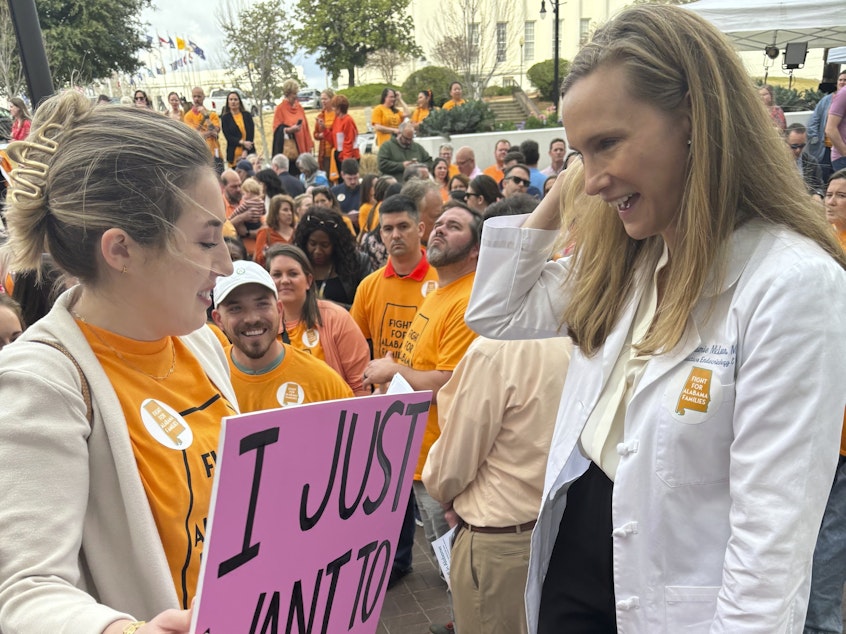Alabama governor signs IVF bill giving immunity to patients and providers

Updated March 6, 2024 at 10:56 PM ET
The Alabama State Legislature passed a bill Wednesday night granting civil and criminal immunity for in vitro fertilization service providers and receivers.
Republican Governor Kay Ivey signed the bill into law within an hour of it passing the Alabama Senate.
The legislation is designed to allow patients and clinics to immediately restart IVF treatments in Alabama, without fear of legal repercussions if embryos are damaged or destroyed during the medical procedure or related services like embryo storage and shipment.
Many clinics paused IVF services last month after the procedure was thrown into uncertain legal territory by the state Supreme Court's ruling that frozen embryos are "children" with a constitutional right to life.
Sponsored
IVF clinics routinely discard unviable and leftover embryos, a practice which could have led to charges of involuntary manslaughter or homicide under the new legal precedent.
The University of Alabama at Birmingham, one of the largest IVF providers in the state, released a statement that the the law "provides some protections and will therefore allow UAB to restart in vitro fertilization (IVF) treatments."
Another IVF provider told NPR earlier in the day they had already scheduled patients for embryo transfers on Thursday in anticipation of the immunity law's enactment.
Public outrage over court ruling put pressure on lawmakers
State legislators moved quickly to pass a bill that would allow IVF treatments to resume after intense criticism and outcry from patients, parents, and medical professionals.
Sponsored
"They're hearing us loud and clear that this affects Alabama families," says Corinn O'Brien, with the Fight for Alabama Families Coalition. She's one of hundreds of advocates who have been lobbying at the statehouse, and says that effort- plus over 20 thousand emails- ramped up pressure on Alabama lawmakers to take action.
"The last couple of weeks have been devastating for people and they've been left in the lurch of what's going to happen," says O'Brien, who is herself pregnant through IVF and sympathizes with those who were in the middle of their treatment when the court ruling forced a pause.
Speed prioritized over impact
The bill's sponsors in the Alabama House and Senate claim this immunity bill is just a stop-gap measure to allow fertility treatments to resume while lawmakers address the remaining questions raised by the court ruling, which could take a while to work out.
"I think there's just too much difference of opinion on when actual life begins," said Republican Senator and medical doctor Tim Melson, who sponsored the immunity legislation.
Sponsored
"A lot of people say conception, a lot of people say implantation, a lot of people say heartbeat," acknowledged Melson. "I wish I had an answer."
During the floor debate, Melson admitted the legislation leaves many unanswered questions, like whether an embryo frozen for three decades before implantation would be considered 30 years old at birth.
"They could take him to get a driver's license as soon as he's born," he mused. "I don't know, but these are questions we need to answer."
Melson told NPR that he originally intended his bill to define personhood, but removed that language in order to smooth the bill's passage. Still, he argued, his immunity bill accomplishes the short term goal of allowing people to resume treatment without fear that another change to state law could lead to future prosecution.
Rep. Terri Collins, whose identical House immunity bill made it through a vote just three days after being introduced, stressed to her colleagues that the bill is a necessary legislative Band-Aid.
Sponsored
"We are providing with this legislation a pretty broad immunity at this moment in time which to me gives us the impetus to continue to work on this issue for a long term fix," she said.
But not all the members agreed with kicking that can down the road.
Debates during bill's passage raise unanswered questions
Democratic state Rep. Chris England worried that once an immunity bill is signed, lawmakers will lose their sense of urgency and fail to revisit the question of embryonic personhood.
"I get that there's a big issue on pausing the clinics... and the immunity brings some relief that will shield them from being sued," England said during the floor debate. Even so, he urged his colleagues to add personhood language to the existing bill.
Sponsored
"Our temporary solution here is akin to turning a water hose on a burning tree in a forest that's on fire," England said, emphasizing that the immunity bill does nothing to address a minefield of remaining legal questions, like whether doctors who destroy an embryo outside of IVF services could face homicide charges, or whether the state is now required take custody of abandoned frozen embryos.
"I'm not sure if you're prepared to create the Alabama Department of Cryogenics, but that's an issue," England told his House colleagues.
Republican state Rep. Ernie Yarbrough likened clinics' routine destruction of embryos to a "holocaust", and advocated to keep the pause on IVF in order to "make sure we are not endorsing the destruction of lives of children."
In a speech that included quotes from the Bible, the TV show Reacher, and the lyrics of 90's rapper Vanilla Ice, Yarbrough introduced an amendment to the bill to add that "immunity will not be provided to a person who intentionally causes the death of an unborn child."
That amendment, which would have effectively negated the entire intention of the immunity bill, was voted down, and the bill made it through as a simple, two paragraph piece of legislation. [Copyright 2024 NPR]



